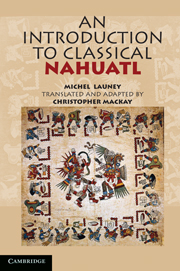Book contents
- Frontmatter
- Contents
- Preface
- How to Use This Book
- PART ONE
- PART TWO
- Lesson Sixteen Agent Nouns, the -ni Form
- Lesson Seventeen Compound Nouns, Verbal Incorporation
- Lesson Eighteen Bitransitive Verbs, Ambitransitive Verbs
- Lesson Nineteen Causative Verbs
- Lesson Twenty Applicative Verbs
- Lesson Twenty-One Honorific and Deprecatory Verbs
- Lesson Twenty-Two Pluperfect, Counterfactual, Vetitive, Directional Conjugations
- Lesson Twenty-Three Morphological Peculiarities of Certain Nouns and Verbs
- Lesson Twenty-Four More on Locatives
- Lesson Twenty-Five More on Quantifiers
- Lesson Twenty-Six Details about Number and Person, Indefinite Pronouns and Adverbs
- Lesson Twenty-Seven Compound Verbs
- Lesson Twenty-Eight Reduplication outside of the Plural, More on Verbs
- Lesson Twenty-Nine Derivative Verbs
- Lesson Thirty Derivative Nouns
- Lesson Thirty-One Noun Clauses
- Lesson Thirty-Two Attributives, Relative Clauses, Copula Verbs, Semi-Auxiliaries
- Lesson Thirty-Three Comparisons, Clauses of Result, Purpose and Cause
- Lesson Thirty-Four Conditions, More Particles
- Lesson Thirty-Five Temporal Clauses, Particles, Interjections
- Appendix One Traditional Orthography
- Appendix Two The Aztec Calendar
- Appendix Three Inflexional Patterns
- Appendix Four Key to the Exercises
- Nahuatl-to-English Vocabulary
- English-to-Nahuatl Vocabulary
- Index
Lesson Thirty-One - Noun Clauses
Published online by Cambridge University Press: 05 June 2012
- Frontmatter
- Contents
- Preface
- How to Use This Book
- PART ONE
- PART TWO
- Lesson Sixteen Agent Nouns, the -ni Form
- Lesson Seventeen Compound Nouns, Verbal Incorporation
- Lesson Eighteen Bitransitive Verbs, Ambitransitive Verbs
- Lesson Nineteen Causative Verbs
- Lesson Twenty Applicative Verbs
- Lesson Twenty-One Honorific and Deprecatory Verbs
- Lesson Twenty-Two Pluperfect, Counterfactual, Vetitive, Directional Conjugations
- Lesson Twenty-Three Morphological Peculiarities of Certain Nouns and Verbs
- Lesson Twenty-Four More on Locatives
- Lesson Twenty-Five More on Quantifiers
- Lesson Twenty-Six Details about Number and Person, Indefinite Pronouns and Adverbs
- Lesson Twenty-Seven Compound Verbs
- Lesson Twenty-Eight Reduplication outside of the Plural, More on Verbs
- Lesson Twenty-Nine Derivative Verbs
- Lesson Thirty Derivative Nouns
- Lesson Thirty-One Noun Clauses
- Lesson Thirty-Two Attributives, Relative Clauses, Copula Verbs, Semi-Auxiliaries
- Lesson Thirty-Three Comparisons, Clauses of Result, Purpose and Cause
- Lesson Thirty-Four Conditions, More Particles
- Lesson Thirty-Five Temporal Clauses, Particles, Interjections
- Appendix One Traditional Orthography
- Appendix Two The Aztec Calendar
- Appendix Three Inflexional Patterns
- Appendix Four Key to the Exercises
- Nahuatl-to-English Vocabulary
- English-to-Nahuatl Vocabulary
- Index
Summary
Clauses as Subject or Object: Indirect Questions
As in English, a clause in Nahuatl can serve as the subject or object of a verb, in one of two ways.
The first is when it is used as an indirect questions. We have already seen examples several times (4.10, 5.4, 14.6–7 etc.). The term indirect question signifies that a question is being reported (i.e., it is dependent upon a verb of saying or thinking), and in English, this change in the status of the question is indicated by a change in word order. In the direct question, the order of the subject is inverted, so that the verb precedes the verb, but in an indirect question, the regular order subject–verb is retained. Also, the person of the verb in the question is changed as appropriate. Thus, you would report the direct question ‘What do you want?’ by saying ‘He asks what I want’. In Nahuatl, an indirect question changes the person of its verb if necessary, but the tense and word order are otherwise unaffected. If the corresponding direct question would be introduced by an interrogative word, the indirect question likewise begins with this interrogative, which may or may not be preceded by in. An indirect question of the type ‘if/whether’ in English, which goes back to a direct question expecting simple yes/no answer, can be introduced in Nahuatl with (in) cuix but also with (in) àzo.
- Type
- Chapter
- Information
- An Introduction to Classical Nahuatl , pp. 317 - 327Publisher: Cambridge University PressPrint publication year: 2011



